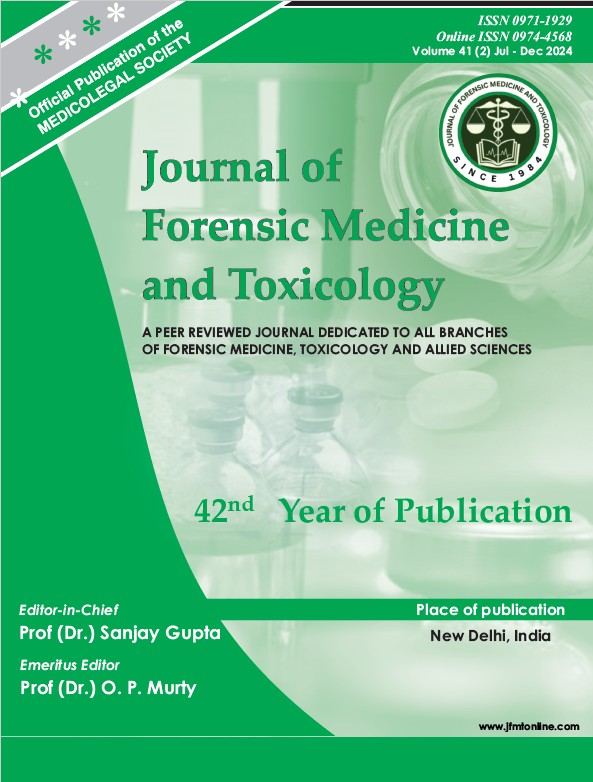FORENSIC ODONTOLOGY – A TECHNOLOGY DRIVEN APPROACH IN HUMAN IDENTIFICATION
Keywords:
Human, circumstances, structures, OdontologyAbstract
Human identification is a major element in forensic investigation with legal, ethical, social, and moral ramifications. Forensic odontology is an integrated specialty that involves identification beyond recognition using oral and para-oral structures such as teeth, jaw bone, saliva, the presence of foreign bodies, skull structures etc1. In circumstances of single corpse identification or mass casualties, this specialty is critical and vital in human identification. Since teeth are frequently resistant to decomposition, they can be used as a tool for forensic identification even in cases of deteriorated and charred bodies. Dr. Oscar Amoedo, known as the “Father of Forensic Odontology,” described the first example and role of dental identification in 1897, when 126 persons were burnt to death in a fire in Paris2.
Downloads
References
Johnson A. Forensic odontology: A paradigm shift in the Indian context. J Forensic Dent Sci. 2018 Sep Dec;10(3):117-118. doi: 10.4103/jfo.jfds_84_18. PMID: 31143057; PMCID: PMC6528539.
Barsley RE (1993). Forensic and legal issues in oral diagnosis. Dent Clin North Am 37: 133–156.
Koh KK, Tan JS, Nambiar P, Ibrahim N, Mutalik S, Khan Asif M. Age estimation from structural changes of teeth and buccal alveolar bone level. J Forensic Leg Med. 2017 May;48:15-21. doi: 10.1016/ j.jflm.2017.03.004. Epub 2017 Apr 1. PMID: 28407514.
Schmeling A, Geserick G, Reisinger W, Olze A. Age estimation. Forensic Sci Int. 2007;165:178–81.
Verma M, Verma N, Sharma R, Sharma A. Dental age estimation methods in adult dentitions: An overview. J Forensic Dent Sci. 2019 May-Aug;11(2):57- 63. doi: 10.4103/jfo.jfds_64_19. Epub 2020 Jan 24. PMID: 32082039; PMCID: PMC7006305.
Zibulewsky J. Defining disaster: the emergency department perspective. Proc(Bayl Univ Med Cent). 2001; 14: 144-149
DVI Guide: INTERPOL. Proposed Amendments: 2018
Rajendran A, Sivapathasundharam B. Shafer2 S Textbook of Oral Pathology. 5 th ed. Elsevier Health Sciences; 2006: p. 59-46.
Johnson A. Application of Saliva in Forensic Odontology: An Update Year : 2019, Volume : 19, Issue : 1 Article DOI : 10.5958/0974-083X.2019.00031.1
Balla SB. Forensic dental identification: Practice in Indian context compared to western countries. J Forensic Sci Med. 2016;2:44–7
Zakirulla M, Meer A. Modern tools in forensic dentistry. J Contemp Dent. 2011;2:28–32
Wood RE, Kirk NJ, Sweet DJ. Digital dental radiographic identification in the pediatric, mixed and permanent dentitions. J Forensic Sci. 1999;44:910–6.
Hubar JS, Carr RF. Computed dental radiography used to reproduce antemortem film position. J Forensic Sci. 1999;44:401–4. [PubMed] [Google Scholar]
Silva RF, Pereira SD, Prado FB, Daruge E, 2nd, Daruge E. Forensic odontology identification using smile photograph analysis – Case reports. J Forensic Odontostomatol. 2008;26:12–7
Johnson A, Gandhi B, Joseph SE. A Morphological Study of Tongue and its Role in Forensics Odontology. J Forensic Sci & Criminal Inves - Volume - 7 Issue - 5 February 2018.
Sherif, A.F., Hashim, A.A., Al Hanafy, M.A. et al. A pilot- cross sectional study of palatal Rugae shape and direction among Egyptians and Malaysians. Egypt J Forensic Sci 8, 17 (2018). https://doi.org/ 10.1186/s41935-018-0050-1
Negi A, Negi A. The connecting link! Lip prints and fingerprints. J Forensic Dent Sci. 2016 Sep Dec;8(3):177. doi: 10.4103/0975-1475.195117. PMID: 28123281; PMCID: PMC5210114.
Abraham S, Jani G, Vinay V, Belcher W, Johnson A. A preliminary study to quantify the efficacy of 3D data acquisition for human bone replication. Journal of Forensic and Legal Medicine 83 (2021) 102244
Johnson A, Jani G, Carew R, Pandey A. Assessment of the accuracy of 3D printed teeth by various 3D printers in forensic odontology. Forensic Science International 328 (2021) 111044




